
Social Analysis
Scope & Guideline
Fostering Scholarly Exchange and Insight
Introduction
Aims and Scopes
- Cultural Anthropology:
The journal emphasizes the study of cultural practices and beliefs, exploring how these shape individual and collective identities across different societies. - Gender Studies:
There is a consistent focus on gender dynamics and the roles of men and women in various cultural contexts, examining how gender influences social relationships and power structures. - Political Anthropology:
The journal investigates political forms, power relations, and governance systems, offering insights into how societies organize and contest authority. - Ethnographic Methodologies:
Social Analysis employs ethnographic methods to gather in-depth qualitative data, highlighting the significance of fieldwork in understanding social realities. - Social Justice and Activism:
The journal often addresses issues of social justice, activism, and community organizing, reflecting on how marginalized groups navigate and challenge societal norms. - Post-Colonial Studies:
A critical examination of post-colonial contexts and the legacies of colonialism in contemporary societies is a recurring theme, providing a nuanced understanding of cultural interactions.
Trending and Emerging
- Digital Anthropology:
There is an increasing focus on the impact of digital technologies on social interactions and cultural practices. This theme is particularly relevant in understanding how digital platforms shape identity, community, and knowledge production. - Migration and Mobility Studies:
Recent papers emphasize the complexities of migration, including the experiences of migrants and the socio-political dynamics surrounding displacement, reflecting a growing interest in global mobility issues. - Environmental Anthropology:
The journal is increasingly addressing ecological concerns, exploring the relationship between culture and environmental change, particularly in the context of climate change and sustainability. - Critical Race Theory:
Emerging discussions on race, identity, and systemic inequality highlight a trend towards incorporating critical race perspectives in anthropological discourse. - Post-Humanism and New Materialism:
There is a noticeable shift towards exploring post-humanist perspectives, questioning human-centric narratives and emphasizing the agency of non-human entities in social analysis.
Declining or Waning
- Traditional Ecological Knowledge:
Previously, there was a stronger emphasis on indigenous knowledge systems and their ecological implications. Recent publications suggest a decline in this focus, possibly overshadowed by more pressing contemporary issues. - Economic Anthropology:
Although economic factors have always played a role in anthropological studies, there seems to be a waning interest in traditional economic anthropology, as the journal has shifted towards more cultural and political analyses. - Comparative Religion:
While religious practices and beliefs are still discussed, the specific comparative analysis of religious systems appears to be less frequent, indicating a shift towards more focused case studies.
Similar Journals

Gazeta de Antropologia
Bridging Cultures Through Scholarly Insight.Gazeta de Antropologia is an esteemed open-access journal dedicated to the field of anthropology, published by the ASOC GRANADINA ANTROPOLOGIA in Spain. Since its inception in 1982, this journal has provided a platform for scholarly research, fostering a global discourse on human cultures and social practices. With an ISSN of 2340-2792, it operates under an open-access model, ensuring that all research is freely accessible to readers worldwide. The journal has been acknowledged in the Scopus Rankings, positioned at #412 out of 502 within the Social Sciences category of anthropology, reflecting its commitment to disseminating high-quality research despite its current Q4 quartile ranking. As it converges its efforts from 2012 to 2024, Gazeta de Antropologia aims to engage researchers, professionals, and students alike, enriching the anthropological landscape through a diverse array of articles that contribute to the understanding of cultural dynamics and social structures.

Anthropological Notebooks
Empowering Scholars to Share Transformative ResearchAnthropological Notebooks, published by the SLOVENE ANTHROPOLOGICAL SOC, is a noteworthy journal within the field of anthropology. Established in Slovenia, this journal aims to provide a platform for scholarly dialogue and dissemination of anthropological research, fostering interdisciplinary approaches and global perspectives. Although it currently holds a Q4 quartile ranking in anthropology and ranks #421 out of 502 in Scopus, it serves as an essential conduit for emerging voices and innovative ideas in the discipline. Covering research published from 2010 to 2019 and from 2021 to 2024, the journal invites contributions that explore diverse cultural narratives and anthropological insights. Despite its limited open access options, Anthropological Notebooks remains a crucial resource for researchers, professionals, and students seeking to engage with contemporary anthropological discourse and enrich their understanding of human societies.
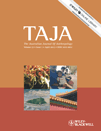
Australian Journal of Anthropology
Bridging Knowledge and Cultural UnderstandingThe Australian Journal of Anthropology, published by Wiley, stands as a pivotal resource in the field of anthropology, reflecting a deep commitment to advancing scholarly discourse since its inception in 1990. With an ISSN of 1035-8811 and E-ISSN 1757-6547, this journal provides a platform for innovative research and critical analysis, contributing to the global anthropology community. Based in the United States, at 111 River St, Hoboken, NJ, it has established itself in the Q3 category of anthropology journals, ranking #162 out of 502 in Scopus, placing it in the 67th percentile among its peers. While it is not currently an open-access publication, the journal remains dedicated to accessibility through institutional subscriptions and provides a wealth of insight into anthropological methods and cultural studies. It seeks to foster interdisciplinary dialogue and promote a comprehensive understanding of social dynamics, making it an essential read for researchers, professionals, and students eager to enrich their knowledge and engage with contemporary anthropological issues.
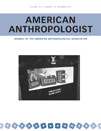
AMERICAN ANTHROPOLOGIST
Shaping the future of anthropology with impactful scholarship.American Anthropologist is a prestigious journal published by Wiley, dedicated to advancing the field of anthropology. With a rich publishing history dating back to 1888, it has become a leading platform for scholarly discourse, showcasing innovative research and diverse perspectives from around the globe. The journal holds impressive ranks within its categories, being recognized as Q1 in both Anthropology and Arts and Humanities, alongside a notable Scopus ranking of #36 out of 502 in Social Sciences. Its robust impact in academia is reflected in its emphasis on interdisciplinary approaches that resonate within the fields of social science and humanities. Researchers and students alike are encouraged to contribute to this vital resource that continues to shape anthropological thought and practice. For those interested, the journal is tailored for non-open access, ensuring the curation of high-caliber scholarly work accessible to a wide audience while supporting the standards of peer-reviewed publications.
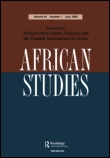
AFRICAN STUDIES
Unveiling the Rich Tapestry of African ScholarshipAFRICAN STUDIES, published by Routledge Journals, Taylor & Francis Ltd, is a leading academic journal that has been at the forefront of African research since its inception in 1942. With an impressive convergence of interdisciplinary insights covering Anthropology, Cultural Studies, History, and Political Science, this journal serves as an essential resource for scholars and practitioners alike. It boasts a notable impact within its field, ranking in the Q1 quartile for Cultural Studies and History and achieving a commendable Q2 for Anthropology, and Political Science and International Relations according to the 2023 category quartiles. Researchers can benefit from the journal's rigorous peer-review process, which ensures high-quality and impactful research dissemination. While it is not an open-access journal, it offers various subscription options for accessing its wealth of scholarly articles. With a commitment to advancing understanding of African contexts and perspectives, AFRICAN STUDIES plays a crucial role in shaping contemporary debates and fostering intellectual engagement within the academic community.

Ecumenica-Performance and Religion
Innovating Insights into Religious Performance.Ecumenica-Performance and Religion is a distinguished journal published by Penn State University Press, focusing on the intersection of performance studies and religious discourse. Since its inception, the journal has dedicated itself to fostering critical dialogue among scholars, practitioners, and students interested in understanding how religious themes manifest through performance arts. Although it operates on a non-open access model, the journal's contributions are pivotal in advancing research in the realms of visual arts, music, and religious studies, as evidenced by its respectable Scopus rankings. With its convergence period spanning from 2019 to 2024, Ecumenica offers a platform for innovative scholarship that explores the complex relationships between religion and performance, pushing the boundaries of contemporary academic discourse. This journal is essential for any researcher or student aiming to deepen their understanding of the dynamic interplay between these multifaceted fields.

Open Library of Humanities
Exploring Contemporary Issues Through Scholarly InsightThe Open Library of Humanities, a premier platform established in 2015 and based in the United Kingdom, elevates the discourse in the fields of Anthropology, Arts and Humanities, Cultural Studies, and Sociology and Political Science. Published by OPEN LIBRARY OF HUMANITIES, this open access journal provides a prominently accessible space for scholars and researchers to disseminate their findings and contribute to a diverse range of academic conversations. With an impressive Scopus ranking that reflects its influence—ranking in the 87th percentile in General Arts and Humanities and in the 80th percentile for Cultural Studies—the journal is recognized for publishing high-quality research that addresses significant and contemporary issues within its scope. By embracing a multidisciplinary approach, the Open Library of Humanities fosters interdisciplinary dialogue and encourages innovative research dissemination practices. Scholars, students, and practitioners are invited to engage with the latest developments and theoretical insights that enrich our understanding of the human experience.
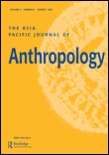
Asia Pacific Journal of Anthropology
Championing Scholarly Excellence in AnthropologyAsia Pacific Journal of Anthropology is a premier academic journal dedicated to advancing the field of anthropology and cultural studies, published by Routledge Journals, Taylor & Francis Ltd. With an ISSN of 1444-2213 and E-ISSN 1740-9314, this journal has gained recognition for its rigorous scholarly contributions since its inception in 2000. Situated in the UK, it is strategically positioned to serve as a vital resource for researchers, professionals, and students exploring the rich complexities of human societies and cultures within the Asia Pacific region and beyond. As evidenced by its Q2 ranking in both anthropology and cultural studies for 2023, alongside its impressive Scopus ranks—#218 among 1304 in Cultural Studies and #157 among 502 in Anthropology—this journal illustrates a strong commitment to delivering high-quality, impactful research. While it is not an open-access journal, it remains a key platform for disseminating innovative research and fostering academic dialogue, thereby significantly contributing to the advancement of knowledge in the social sciences.

Altre Modernita-Rivista di Studi Letterari e Culturali
Illuminating the Complexities of Cultural StudiesAltre Modernita-Rivista di Studi Letterari e Culturali, published by Milano University Press, serves as a significant platform in the fields of Cultural Studies, Linguistics, and Literature. Since its transition to Open Access in 2009, this journal has made strides in democratizing knowledge, ensuring that resources and research are accessible to a broader audience. With an ISSN of 2035-7680, it publishes innovative research and critical discourse aimed at fostering interdisciplinary dialogue within the humanities. Although currently positioned in Q4 and Q3 quartiles, Altre Modernita is steadily contributing to academic conversation, promoting literary analysis, cultural critique, and linguistic exploration. Located in Italy, it invites contributions from scholars worldwide, encouraging a diverse range of perspectives. Altre Modernita remains a valuable resource for researchers, professionals, and students dedicated to understanding the complexities of modern literature and cultural narratives.
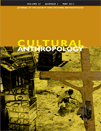
CULTURAL ANTHROPOLOGY
Innovating the Study of Humanity's Rich TapestryCULTURAL ANTHROPOLOGY is a premier journal in the field of anthropology, published by the esteemed SOC CULTURAL ANTHROPOLOGY. With an impressive impact factor and ranking in the Q1 category for both anthropology and arts and humanities, it stands as a leading platform for scholarly discourse and innovative research. Since transitioning to Open Access in 2014, the journal has made substantial contributions to the accessibility of anthropology literature, allowing a broader audience to engage with cutting-edge anthropological insights and findings. The journal's scope encompasses a wide range of cultural studies and anthropological perspectives, catering to a diverse readership that includes researchers, professionals, and students. Published from the Department of Anthropology, Rice University in Houston, Texas, CULTURAL ANTHROPOLOGY continues to shape the conversation in its field, promoting interdisciplinary dialogue and enriching the academic landscape.